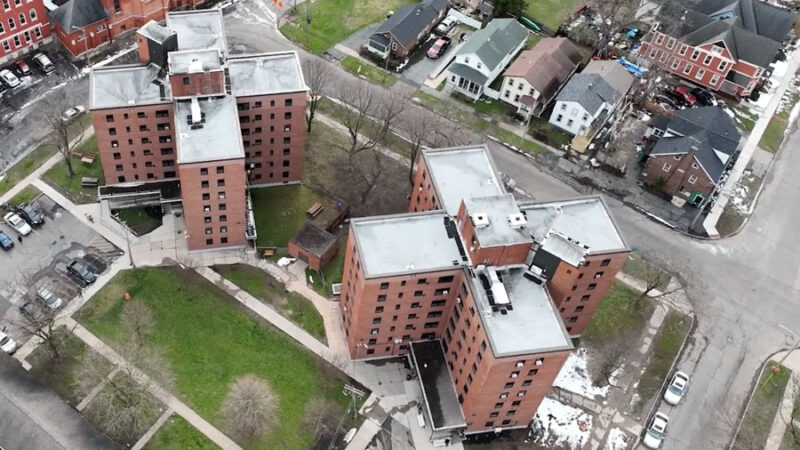Two startups that received Wells Fargo Foundation support are fostering new technology with immense potential to modernize buildings and improve people's lives.
NORTHAMPTON, MA / ACCESSWIRE / June 17, 2024 / Upstate New York's snowy winters don't get to Dason Motayne, but the sweltering summers, which outcompete his mid-century apartment's air conditioning, do.
"I think [my AC] is about to die," he said. "It's an old building, so it's hard to regulate it in the summertime."
That old building - the 418 Fabius senior public housing complex in Syracuse, New York - is far from unique. It was built in the 1950s, a time when the U.S. government authorized a huge influx of some 135,000 units of public housing per year. In 2018, inspectors found more than one in four public housing units were in a state of disrepair (PDF). Whether due to poor insulation or little to no air conditioning, these public housing buildings struggle with cooling, which means that the disproportionately older and chronically ill residents are more vulnerable to poor indoor air quality and worsening heat waves.
Unfortunately, these types of public housing buildings have seen fewer investments or innovations that could make them more comfortable - and more environmentally sustainable, said Bill Simmons, executive director of Syracuse Housing Authority, which owns 418 Fabius.
"Who's there to speak for the little guy to say, ‘Let's try it here in public housing,' where we could benefit and our resources are very, very scarce?" Simmons said.
Enter David Goldstein. Together with Lisa Hart, a public health analyst and grants manager at Syracuse Housing Authority, Goldstein is hoping to use public housing as a place to demonstrate a new innovation that could enhance aging buildings around the globe.
"Heating and cooling are major factors deciding quality of life around the world," Hart said. "It's the marginalized, the lowest income population who'd be able to benefit first from this project."
How can occupied buildings be retrofitted for a net-zero future?
In Queens, 250 miles from Syracuse, Goldstein looks out the window of his home office and sees our heating-cooling problem - and a potential solution.
"I have a nice view of Manhattan, and even in just New York City, there are literally hundreds of thousands of buildings that need to be retrofitted if we want to be net-zero by 2050," he said. "We're just not going to do open-heart surgery on all these buildings."
In 2020, Goldstein, an experienced mechanical engineer, was pondering this view when it dawned on him: "Why not wrap buildings in a heated blanket?"
Goldstein invented prefabricated, modular panels with heating, cooling, and ventilation that are installed onto a building's façade. They can work with a variety of energy-efficient HVAC systems, including heat pumps. With these panels, a retrofit - rather than a costly rebuild - can bolster insulation, replace leaky windows, and filter indoor air of mold, smoke, and other pollutants.
These first-of-their-kind panels may work especially well for large-scale housing projects where people already live. By installing the panels from the exterior, residents may be minimally disrupted.
Goldstein founded Hydronic Shell Technologies to test his idea on real buildings. Its potential is huge. Modernizing older, inefficient buildings helps to improve unhealthy indoor air quality, reduce energy use, and save residents money. It could also help to save lives and improve residents' quality of life.
"I couldn't just turn my back on these people that need help," he said. "I really think I can help them."
Funding and partnerships can make scalable decarbonization a reality
Goldstein needed help to get his system out into the real world. He turned to the Housing Affordability Breakthrough Challenge, a $20 million competition from the Wells Fargo Foundation and Enterprise Community Partners to scale innovative housing solutions. One of six winners in 2023, the startup received a $3 million grant, paving a way for Goldstein to develop a prototype.
Once the prototype passes a series of tests, the technology will be installed for the first time on a wing of 418 Fabius in Syracuse. The project is expected to begin in late 2025.
Among the project partners is BlocPower, another startup that received support from Wells Fargo to help more communities access the benefits of clean energy technologies. The Brooklyn, New York-based company participated in the Wells Fargo Innovation Incubator (IN2) program and is now overseeing community engagement and construction management for Hydronic Shell's efforts in Syracuse.
"Support that's coming from Wells Fargo is really helping to fund that [cleantech] ecosystem," Goldstein said. "As an industry, we can develop those innovative, those outside the box, solutions that we need in order to solve these huge challenges."
Dom Lempereur, chief engineer at BlocPower, says if the Syracuse project is successful, the company could plug Goldstein's technology into affordable housing retrofits nationwide.
"From a construction perspective, it's brilliant," he said. "If we can demonstrate this [in Syracuse], we'll be extremely interested to have this as part of our offering."
What will success look like? Goldstein will be measuring energy use, indoor air quality, and heating and cooling after the retrofit. But one of the most important markers will be if residents love it.
"What I hope will happen is that people in other buildings start demanding it," he said.
If they do, it could be the first step into making Syracuse, and then the country, more sustainable.
"This could be so much bigger than this one building," Hart said. "This invention could really be a worldwide phenomenon. Everywhere in the world needs to decarbonize."

View additional multimedia and more ESG storytelling from Wells Fargo on 3blmedia.com.
Contact Info:
Spokesperson: Wells Fargo
Website: https://www.3blmedia.com/profiles/wells-fargo
Email: info@3blmedia.com
SOURCE: Wells Fargo
View the original press release on accesswire.com




